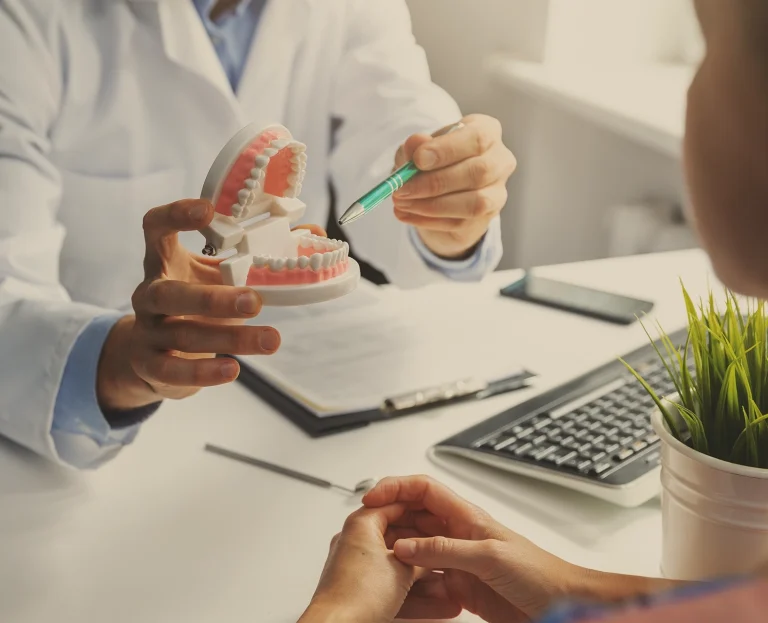You know the drill, a cavity in your tooth. Cavities in the teeth are a common and annoying problem that can cause tooth pain. If a cavity is not detected in time or not treated properly, it can lead to more serious dental problems. In this blog, we will tell you exactly what cavities are, how to recognize them and what you can do to prevent cavities in your teeth or how they can be treated.
What are holes?
Cavities in your tooth is also called tooth decay or caries. A cavity is a small damage in the enamel of your teeth caused by an infection. This infection occurs when bacteria in your mouth convert sugars into acids. These acids then attack the tooth enamel and can cause cavities. If a cavity is not treated in time, it can grow deeper into the tooth, which can lead to serious problems or inflammation.
Recognizing cavities in tooth
Detecting a cavity in time can help prevent further problems. But how can you recognize a cavity in the tooth? A tooth with a cavity is often very sensitive. You may notice this especially when eating or drinking hot, cold or sweet things. A cavity in the tooth can also cause tooth pain. Especially in the later stages of a cavity, you may experience pain when chewing or biting. In most cases, a cavity is not immediately visible, but that is not always the case. You can sometimes recognize a cavity by a brown or dark spot on the teeth.
The occurrence of cavities
Cavities therefore occur because certain acids attack tooth enamel. In the mouth live many different bacteria that feed on sugars and carbohydrates from our daily diet. These bacteria convert these sugars into acids. Saliva plays a major role in neutralizing these acids in the mouth. When not brushing enough, eating and drinking a lot of sugary products, or when saliva production is reduced, due to medication for example, the risk of developing cavities is higher.
How can you prevent cavities in the tooth?
Cavities in your teeth can be prevented quite easily. There are a number of effective ways to keep your teeth healthy: proper oral care, watching your diet and visiting the dentist regularly.
Good oral care
Step 1 in preventing cavities is taking care of your teeth. Brush well with fluoride-containing toothpaste at least twice a day. Preferably use an electric toothbrush because it is better at removing plaque. Food particles that accumulate between your teeth are the main cause of cavities. Therefore, also floss daily with a floss, toothpick or rager to keep hard-to-reach areas clean. If you have sensitive teeth, you can also rinse your mouth an extra time with mouthwash or rinse aid. For general oral hygiene, use a tongue cleaner to remove bacteria from your tongue.
Healthy nutrition
The bacteria in your mouth are fed by sugars and carbohydrates. Therefore, limit your intake of sugars and starchy foods. Instead, choose vegetables, fruits and whole grains. In addition, drinking enough water helps hydrate the mouth and neutralize acids. Not only the products you eat, but also the times of day when you eat affect the development of cavities. Don’t eat at too many different times. Each time you eat, acids are produced. After eating, the saliva in your mouth needs time to neutralize these acids again. Try to limit your meals to a maximum of 7 meals (3 meals and 4 snacks).
Regular dental visits
Even if you eat healthily and take good care of your mouth, a cavity may still develop in your teeth. Therefore, have your teeth checked by your dentist at least once every six months (or twice a year). A dentist can detect incipient cavities and give you advice on taking care of your teeth. In addition to dental visits, it is also recommended that you have your teeth cleaned regularly by a dental hygienist. Plaque and tartar that you have missed with tooth brushing will be removed so you can get back to clean teeth.
Treating cavities
Then, if you did discover a cavity in your tooth, there are several treatments to treat a cavity. For small cavities, the hole in the tooth can be filled with a filling of usually composite, amalgam or gold. To do this, the affected part of the tooth is first removed using a small drill and then filled. For larger cavities, it may be chosen to grind off the tooth until a healthy part of the tooth remains. This remaining piece of tooth is then fitted with a crown to protect the tooth. If a cavity is not treated in time, it can penetrate deeper into the tooth. The tooth decay can then affect the dental nerve and cause inflammation in the root. If the nerve in the tooth is affected, root canal treatment is needed to remove it.
Contact a dentist?
Do you suspect a cavity in one of your teeth, or have questions about the health of your teeth? If so, do not hesitate to contact a dentist. Prevention is better than cure, especially in the case of cavities in your teeth. For advice or questions, please contact Scheldebuurt dental office. Through a specialized approach we ensure that everyone can walk the streets with a smile again!
